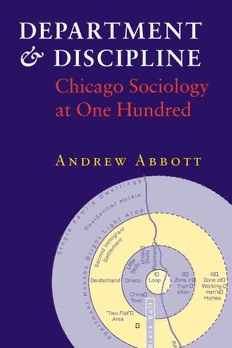
Department & discipline : Chicago sociology at one hundred PDF
Preview Department & discipline : Chicago sociology at one hundred
Department & Discipline Department & Discipline CHICAGO SOCIOLOGY AT ONE HUNDRED Andrew Abbott THE UNIVERSITY OF CHICAGO PRESS Chicago & London ANDREW ABBOTI is the Ralph Lewis Professor in the Department of Sociology and the College at the University of Chicago. He is the author of The System ofP rofes sions: An Essay on the Division of Expert Labor, published by the University of Chicago Press, which won the Sorokin Prize of the Americal Sociological Associa tion in 1991. The University of Chicago Press, Chicago 60637 The University of Chicago Press, Ltd., London © 1999 by The University of Chicago All rights reserved. Published 1999 08 07 06 05 04 03 02 01 00 99 1 2 3 4 5 ISBN: 0-226-00098-2 (cloth) ISBN: 0-226-00099-0 (paper) Library of Congress Cataloging-in-Publication Data Abbott, Andrew. Department and discipline: Chicago sociology at one hundred. p. cm. Includes bibliographical references. ISBN 0-226-00098-2 (cloth: alk. paper). - ISBN 0-226-00099-0 (paper: alk. paper) 1. Chicago school of sociology-History. 2. American journal of sociology-History. 3. University of Chicago. Dept. of Sociology History. 4. Sociology-United States-History. 5. Sociology United States-Periodicals-History. 6. Sociology-Illinois Chicago-History. I. Title: Department and discipline. HM22.U5A23 1999 301'.09-dc21 98-55981 CIP @The paper used in this publication meets the minimum requirements ofthe American National Standard for Information Sciences-Perma nence of Paper for Printed Library Materials, ANSI Z39 .48-1992. For Woody Contents Preface ix Prologue 1 1 The Historiography of the Chicago School 4 2 Transition and Tradition in the Second Chicago School 34 With Emanuel Gaziano 3 Albion Small's AJS 80 4 The AJS of the Chicago Schools 104 5 The AJS in Transition to Professionalism 138 6 The AJSin Modern Form 165 7 The Continuing Relevance of the Chicago School 193 Epilogue 223 Sources and Acknowledgments 227 References 231 Index 245 Vll Preface Sometime in 1992 Marta Tienda, then editor of the American Journal of Sociology, asked me to undertake a history of the journal, to be published during its centennial in 1995. Busy with other things, I de clined. Truth to tell, I had a decidedly mixed attitude toward sociology journals. Like many people, I found most journal articles competent but dull. Certainly my own best papers-if "best" means most cited-had al most invariably been rejected by major journals, AJS conspicuous among them. But Professor Tienda was persistent and eventually prevailed upon me. Once I headed for the archives, the project took on a life of its own. Dili gent searches in attics and cellars failed to find any early AJS archives, so the early years had to be reconstructed from the personal papers of various fac ulty. But those faculty files challenged much of the Chicago lore that I had picked up over the years. It became necessary to think about the history of the department more broadly in order to envision that of the AJS. At this point I became involved in Gary Fine's edited volume on the second Chicago school, to which I ended up contributing a chapter-coauthored with Manny Gaziano-about the faculty during the postwar period. By now the AJS centennial year was looming ominously. I had become a dean, and the project was going much slower than expected. I had also be come chair of the American Sociological Association's Publications Com mittee, which gave me a bird's-eye view of sociological publishing and a much broader set of theoretical issues to consider. I produced a draft of the first half of the AJS history in 1995, a draft that showed how much our vi sions of this project had diverged. On their side, the AJS board were horri fied by the length of the paper and by the fact that it didn't include formal theories and tests of hypotheses. Analytic history baffled them. For me, by contrast, the historical complexities demanded a monograph. Understand ing the AJS meant understanding the department and, as gradually became clear, understanding the discipline as well. Studying the AJS was a way of rethinking how disciplines and schools develop, a task that seemed theoret ical enough. Moreover, I was plowing what seemed virgin soil; there was al- ix
